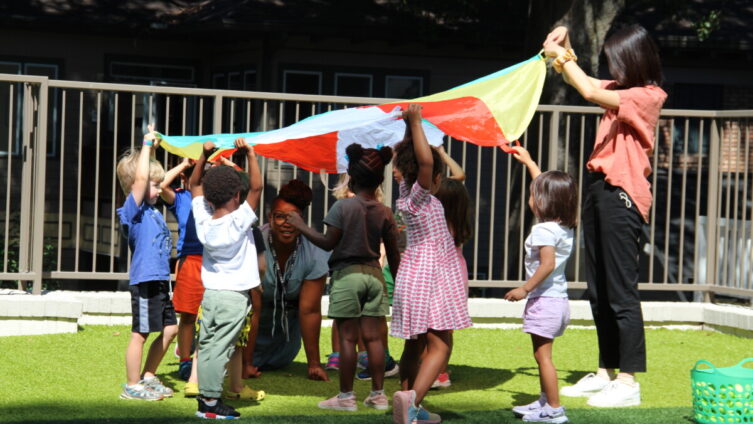
By Elena Jaime
Director of Lower School (Preschool – Grade 3)
Director of Lower School Elena Jaime is a progressive educator with more than two decades of experience in education. She’s also a parent to three TCS children.
The Children’s School believes play is serious learning because of the profound impact of play on children’s learning and development.
As a parent and a progressive educator with over two decades of experience, I know the role of play in nurturing academic success and building lifelong learners.
Creating a Safe and Connected Community
The foundation of academic success lies in creating a safe and connected community. When children feel safe and connected, they are more likely to take risks and engage in the learning process. This sense of security is crucial for nurturing and challenging young minds.
Play as the Highest Form of Research
Albert Einstein famously said, “Play is the highest form of research.” Here are three key reasons why play is a crucial element in education:
- Develops Executive Functioning Skills: Play and playfulness help develop executive functioning skills, which are essential skills for success in high school and beyond. Executive functioning skills include focus, attention, planning and problem-solving.
- Builds Brain Pathways: Engaging in imaginative play creates neural pathways in the brain that support essential cognitive functions. This process aids in problem-solving and critical thinking, which are vital for academic achievement.
- Fosters Social Connection: Play is inherently social, and it meets the fundamental human need for social connection. When children collaborate and work together during play, they satisfy their innate desire for social interaction, promoting a positive learning environment.
Intrinsic Motivation for Learning
The intrinsic motivation for learning begins with play. By providing space for children to pursue their interests, ask questions, and explore the world around them, educators create a feedback loop of excitement for learning. This joy and engagement in learning fuel problem-solving and active brain engagement, leading to a lifelong love of learning.
Designing a Playful Learning Environment
To create a rich learning experience that utilizes the benefits of play, TCS uses these components:
- Active Learning: Encourage students to learn through doing, engaging their senses and bodies to create neural pathways and deepen understanding.
- Reflection: Learning happens during reflection, so allow time for students to process and think about their experiences.
- Appropriate Stress Levels: Maintain a balance of stress that motivates students without overwhelming them. Stress can help drive problem-solving, but too much can hinder learning.
- Incorporating Movement: Engage the whole body in learning experiences, as this builds more neural pathways and enhances comprehension.
Playful Learning Experiences at TCS
At TCS, the Lower School (3’s/4’s – grade 3) focuses on combining direct hands-on experiences with explicit instruction in literacy and math. Programs like Orton-Gillingham and our Singapore-based math program, “Math in Focus,” are used to build foundational skills. These skills become the basis for deep, project-based learning, where students apply their knowledge to real-world problems and challenges.
For example, third-grade students at TCS are studying natural disasters and their impact on communities. They read data, analyzed graphs, and considered the effects on the environment. Through this project, they learned to think critically and explore solutions to complex issues, such as climate change.
Play fosters the development of essential skills, builds brain pathways, satisfies the need for social connection, and sparks intrinsic motivation for learning. At TCS, this philosophy is put into practice through a curriculum that blends hands-on experiences, explicit instruction, and project-based learning. By understanding and embracing the academic benefits of play, educators and parents can empower children to thrive academically and become lifelong learners.









